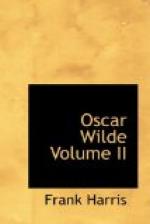Write to me with full frankness, about yourself: about your life: your friends: your occupations: your books. Whatever you have to say for yourself, say it without fear. Don’t write what you don’t mean: that is all. If anything in your letter is false or counterfeit I shall detect it by the ring at once. It is not for nothing, or to no purpose that in my lifelong cult of literature, I have made myself,
“Miser of sound and
syllable, no less
Than Midas of his coinage.”
Remember also that I have yet to know you. Perhaps we have yet to know each other. For myself, I have but this last thing to say. Do not be afraid of the past. If people tell you that it is irrevocable, do not believe them. The past, the present and the future are but one moment in the sight of God, in whose sight we should try to live. Time and space, succession and extension, are merely accidental conditions of a thought. The imagination can transcend them and more, in a free sphere of ideal existences. Things, also, are in their essence what we choose to make them. A thing is, according to the mode in which one looks at it. “Where others,” says Blake, “see but the dawn coming over the hill, I see the sons of God shouting for joy.” What seemed to the world and to myself my future I lost irretrievably when I let myself be taunted into taking the action against your father, had, I daresay, lost in reality long before that. What lies before me is the past. I have got to make myself look on that with different eyes, to make the world look on it with different eyes, to make God look on it with different eyes. This I cannot do by ignoring it, or slighting it, or praising it, or denying it. It is only to be done fully by accepting it as an inevitable part of the evolution of my life and character: by bowing my head to everything that I have suffered.
How far I am away from the true temper of soul, this letter in its changing, uncertain moods, its scorn and bitterness, its aspirations and its failures to realise those aspirations shows you quite clearly. But do not forget in what a terrible school I am setting at my task. And incomplete, imperfect, as I am, yet from me you may have still much to gain. You came to me to learn the pleasure of life and the pleasure of art. Perhaps I am chosen to teach you something much more wonderful, the meaning of sorrow and its beauty.
Your affectionate friend,
OSCAR WILDE.
This letter of Oscar Wilde to Lord Alfred Douglas is curiously self-revealing and characteristic. While reading it one should recall Oscar’s provocation. Lord Alfred Douglas had driven him to the prosecution, and then deserted him and left him in prison without using his influence to mitigate his friend’s suffering or his pen to console and encourage him. The abandonment was heartless and complete. The letter, however, is vindictive: in spite of its intimate revelations Oscar took care that his indictment should be made public. The flagrant self-deceptions of the plea show its sincerity: Oscar even accuses young Alfred Douglas of having induced him to eat and drink too much.




